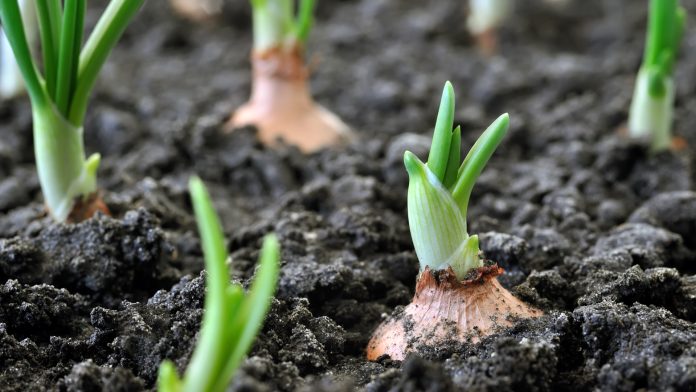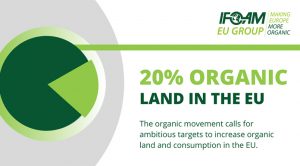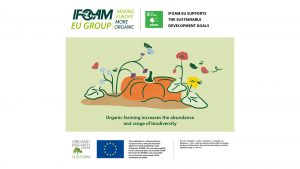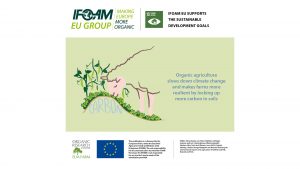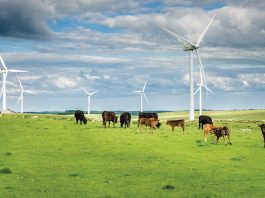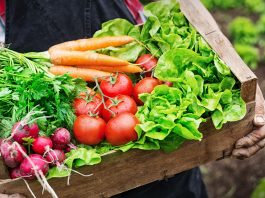IFOAM EU’s Policy Manager, Eric Gall, spoke to The Innovation Platform about the benefits of organic farming, the European Commission’s Farm to Fork strategy and the Common Agricultural Policy (CAP).
IFOAM EU is the European umbrella organisation for organic farming. It fights for the adoption of ecologically, socially, and economically sound systems based on the principles of organic agriculture – health, ecology, fairness, and care. With more than 210 member organisations its work spans the entire organic food chain and beyond: from farmers and processors, retailers, certifiers, consultants, traders, and researchers to environmental and consumer advocacy bodies.
The Innovation Platform spoke with IFOAM EU’s Policy Manager, Eric Gall, about the benefits of organic farming, as well as other areas such as the European Commission’s Farm to Fork strategy and the Common Agricultural Policy (CAP).
What is involved in organic farming? What are some of the main benefits?
Organic farming is a production system that aims to sustain the health of soils, ecosystems, and people. It is about working with nature, rather than against it – such as working with ecological processes, biodiversity and cycles that are then adapted to local conditions. It also seeks to avoid the use of external inputs, and instead relies on ecological processes. We often say that organic farming is knowledge intensive, instead of input intensive.
Healthy soils are a cornerstone of organic farming because in order to prevent pests and diseases, you need to build soil fertility and soil health. As a result, organic farming seeks to close nutrient cycles as much as possible and relies on longer and more diversified crop rotations. In organic farming, the use of synthetic fertilisers is prohibited. Hence, the focus on building soil health and fertility, and using nitrogen fixing plants in crop rotations to build up the nitrogen levels in soils. The use of synthetic pesticides is also banned; only natural substances are allowed.
Organic farming also provides benefits for animal welfare – limiting the number of animals per hectare is one of the starting points of organic farming to make sure that you respect the land carrying capacity. There are proven benefits for biodiversity – for instance, meta studies have shown that there is 30% more diversity of species on organic farms and 50% more abundant wildlife on average.
What role can organic farming play in the Farm to Fork strategy?
We believe that the Farm to Fork strategy should build on the success of organic farming and should include targets to further develop organic farming in Europe. This is not only due to the fact that organic farming is a proven and successful way to produce food without pesticides and with benefits for the environment, but also because it is a beneficial business model for farmers who convert to organic farming. This is because they have less costs and less inputs to buy on the one end, while they get a premium when they sell their products as organic.
Indeed, organic farming is a farming model with proven environmental benefits and with proven economic benefits for farmers. We believe that the Farm to Fork strategy should really build on organic farming and make it a goal of a European Union to have more organic farming in Europe. IFOAM EU suggested a target of 20% of organic land in Europe by 2030.
We believe this target is both realistic and ambitious if the right policy mix is used at the EU and national levels. Beyond organic farming itself, the European Union is considering having targets to reduce the use of pesticides and antibiotics, to which organic farming also directly contributes. Moreover, from the point of view of regenerating soils, for example, organic farming is also a model for research, and some organic farming practices can also be used by conventional farmers to lessen the impact of conventional farming on the environment. Organic farming is a good model and should be a source of inspiration for conventional farmers. That is why we encourage the European Union to include two targets for organic farming.
We need EU targets to increase both the production and consumption of organic products, in line with the push-pull approach that has been successful in countries like Denmark. Firstly, there should be a target of 20% of organic land in the EU by 2030, but there should also be a target to increase the demand for organic products (for instance, a target of 20% of organic products in public canteens all over the EU because, which is achievable as there is a market for it).
There are currently very high growth rates in many countries, and the demand is growing faster than the production itself in Europe. But it is true that there are some countries, especially in Eastern Europe, where the organic market is much less developed and for which it is also important to have public and promotion policies over the use of so-called ‘green public’ procurement to boost the demand for organic products. For example, a country like Denmark could have a national target of 60% of organic products in public canteens (such as schools and hospitals).
With the right policy mix in place, this push-pull approach alongside the introduction of policies to increase production the one hand and demand on the other through public procurement has proven to be very successful in several countries, with Denmark being the first to boost both production and demand. We believe that organic farming can play a central role in the Farm to Fork strategy.
How do you believe that the target of 20% organic land by 2030 can be achieved? And what role does the Common Agricultural Policy (CAP) play in this?
The CAP has an essential role to play if we want to increase organic farming in Europe. The CAP is 40% of the European Union’s budget (€365bn over seven years). As a result, it provides us with both the budget and policy tools required to change farming in general. Under the current CAP, only 1.5% of the budget goes to organic farming (in terms of organic conversion and organic maintenance).
We need public support for farmers in general, and we would like to be able to help them change their practices so as to have a more positive impact on the environment. Furthermore, we believe, in a general sense, that the core principle of the next CAP should be to reward farmers for the public goods they deliver and the focus they place on reducing their environmental impact. Currently, the CAP mostly consists of untargeted payments – it is essentially a form of income support for farmers. We believe that the system should stop and then only allow farmers to obtain money on the basis of the contribution to the protection of the environment (amongst other things) and, moreover, that this should apply to all farmers.
That being said, we are not there yet. At the moment, it is important to increase the budget to both incentivise the move to organic farming and, indeed, to actually make it possible for more farmers to convert to organic farming. This is important because in some countries such as France, there was a budget plan for organic conversion in the current CAP, but because the rate of conversion to organic farming was much higher than what the government had expected they quickly ran out of money. This meant that there was no funding available for new farmers who wanted to convert to organic farming. As a result, this created something of a bottleneck – payments for conversions from the French government were delayed for the next three years. This is a huge problem for farmers, and it is crucial to have ambitious budgets for to promote the conversion to organic on the one side, but also to reward organic farmers for the benefits they provide for the environment and for society on the other. This is the justification for having payments for organic maintenance. This support for organic farming has to be in line with the targets that the Commission will hopefully include in the Farm to Fork strategy.
The Commission has also proposed a new delivery model, which means that Member States will have more flexibility on how they use CAP money and will also have to design strategic national plans for the CAP. As a result, it will be up to Member States to decide which measures they take at the national level and whether they will include either organic farming conversion and maintenance or use innovative mechanisms (such as the proposed eco schemes), which could be used for rewarding organic maintenance. This should be up to Member States, but there should also be a necessary budget for the support of organic farming at the national level if we want to reach these European targets.
Last but not least, we are asking the European Parliament to include an obligation for Member States at the national level to set themselves a target for organic land in their country and put the necessary budgets and financial means to reach these targets in their CAP national plans. This would result in an aspirational target at the EU level and would provide a basis for the European Commission to check whether national CAP plans are ambitious enough.
The Member States would be will be free to decide the level and provide the necessary budget for the targets they set for themselves, while the link to the CAP is also crucial for the farm advisory services because one of the keys of success for farmers to convert to organic farming is their agronomic knowledge of alternatives. For this, they will have independent farmer advisory systems in place, which would be ideally geared at helping farmers to transition to agroecological practices, whether organic or something else. We believe that this is very important and, indeed, that it is crucial that more of the CAP budget is dedicated to providing support and advice to farmers to change their practices in general.
However, in order for success to be achieved in these areas we need enough funding for research. Much of the currently available finances are funnelled into conventional farming or biotech approaches with new genetic engineering techniques. But we believe it is important to have more budgets for agroecology in order to also trigger innovation in organic farming and agroecology.
How is IFOAM EU involved in the EU Food Policy Coalition?
The Food Policy Coalition began from the notion that the CAP should evolve from being an agricultural policy to an EU food policy. That is, it should not just be the European Agriculture Committee or Parliament that gets to decide on the objectives of CAP or how the CAP budget should be used because agriculture has a huge impact on the whole of society and the environment. It is a policy that is much broader than just giving income support to farmers.
From this point of view, there should be a much broader involvement at the level of public authorities on who has a say on what the CAP should look like, and this should definitely include environmental authorities. The whole governance aspect is very important to ensure that the CAP is in line with the citizens’ expectations on how farming should be, as well as which kind of food should be available and at what price.
It was decided that there should be a permanent coalition of civil society organisations, and the EU went on to invest human resources in order to be a part of the steering committee of this coalition. This is important because we are not only fighting to defend the interests of organic farming; the vision of the organic movement is for all European agriculture to change, for us to preserve those natural resources which are the basis of food production (biodiversity, healthy soils etc.), that we stop using pesticides and GMOs, and that we provide healthy and nutritious food to people as well.
We are actively involved in this Food Policy Coalition because we believe that we need a fundamental change in agricultural systems, as well as in the Common Agricultural Policy. For that to happen, we need to build on the coalitions so that they are as broad as possible. Organic farming is a successful model which already provides an important contribution to making European agriculture more sustainable. Organic is 8% of EU land on average, but there are some countries which are much higher in organic farming. In my own country, France, 10% of farmers are now organic, and we have growth rates of 15% in terms of demand every year.
Organic farming already plays a fundamental role in changing European agriculture, but it could play an even more important one and it should also be an inspiration for other conventional farmers to also improve their own practices.
What are three main points you would like to share surrounding the Farm to Fork strategy and the CAP?
The first important thing is that the Farm to Fork strategy should propose a new narrative around agriculture and really build a shared common vision of food production based on system stability and resilience, the preservation of natural resources, and around agro-ecology.
The second point is that while it is all well and good to have a new narrative and to say that we must stop business as usual in agriculture and stop using pesticides, but we also need concrete action. And this can be achieved via ambitions targets. That is why we are asking for such targets in order to reduce pesticide and antibiotic use and to increase organic farming in Europe. We need a combination of a new narrative based on agroecology on the one hand, with ambitious targets that can lead to concrete action the ground on the other.
A third point necessarily links to the CAP: the CAP proposal was made before the election, before the EUs developed the Green Deal, and before they unveiled their intention to develop a Farm to Fork strategy. There is now pressure, from some lobby groups, to postpone the Farm to Fork strategy and to accelerate the CAP negotiations. Our perspective is that it should be the other way around – the Commission should deliver on the Farm to Fork strategy as soon as possible, by 20 May, and the CAP negotiations should make sure that the level of ambitions for agriculture in terms of environmental impact and support for farmers. Moreover, we would like to see all of this become integrated fully in both the CAP objectives and the mechanisms and tools that Member States should implement on the ground and make available for their farmers to help them to transition to agroecological practices.
We should move away from the system of giving untargeted payments to farmers based on the size of their farms and move towards systems where we reward farmers for the public goods they deliver, including their contribution to preserving soils, water quality, air quality, and biodiversity.
We have provided several very detailed proposals on how existing sustainability assessments tools could be used at the farm, for example through point systems – a farmer will get a number of points depending on their practices and will then get payments from the CAP accordingly. Moreover, we have gone into detail to propose that Member States could use such systems to receive payments depending on their contribution to public goods.
While, in the European Commission’s proposal it makes sense to have practices which are adapted to the national or even the local context, rather than top down EU measures, we have learned from experience that when you give more flexibility to Member States on how they use CAP money it will become a race to the bottom, and this always leads to less ambition and less environmental measures. We are therefore concerned as to what that outcome might be and so besides the flexibility given to Member States with the new CAP, we believe it is important to have earmark budgets at the EU level dedicated to environmental and climate action. We are thus calling for 70% of the CAP budget to be dedicated to these areas, meaning that Member States would be forced to dedicate 70% of their international CAP budgets to helping farmers transition to agroecology as well. This could go some way to eradicating the race to the bottom and subsequent lack of ambition that we predict.
There is a lot that could be said about the innovation potential of organic farming. A few months ago, TP Organics (Technology Platform Organics) published a new strategic agenda for research. This is an important way of providing input to the European Commission on how they could use research money in order to provide a bigger research budget for agroecological approaches.
Organic farming is an extremely innovative sector. However, being innovative in the sense of designing new agronomic models rather than in the sense of having more high-tech solutions, has allowed farmers to be less dependent on external inputs. This is the kind of innovation that we are calling for.
 Eric Gall
Eric Gall
Policy Manager
IFOAM EU
+32 2 280 12 23
info@ifoam-eu.org
Tweet @IFOAMEU
www.facebook.com/IFOAMEU
www.ifoam-eu.org
Please note, this article will also appear in the second edition of our new quarterly publication.

